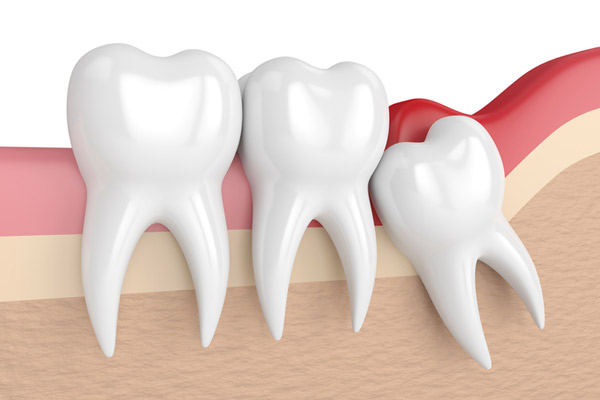 Our last set of molars, the so-called "wisdom teeth," typically erupt between the ages of 17 and 21 for the majority of the population.
Our last set of molars, the so-called "wisdom teeth," typically erupt between the ages of 17 and 21 for the majority of the population. However, while they used to be necessary, they serve little purpose these days. In fact, they are more likely to become a problem than a benefit in the long term.
If your jaw does not have enough room for them (which is usually the case), they can struggle to fully erupt, apply pressure on neighboring molars, or get completely trapped in the gum.
This may lead in gum disease, tooth decay, pain, or similar issues. Mountain State Oral and Facial Surgery can help you remove them in order to help maintain the health of your mouth.
Important Considerations for Removal
Not every wisdom tooth will become an issue.
They should be examined by our professionals through a comprehensive consultation and x-rays to determine whether there is a real need to remove them or not.
There will be no need to pull them out when they normally erupt, or when the removal may lead to unwanted consequences for older patients.
The root of wisdom teeth fully grows late in our twenties. Roots of lower wisdom teeth may touch your inferior alveolar nerve, so a removal may damage them and result in a loss of sensitivity in that region.
Similarly, the root of upper wisdom teeth may be very close to the sinus membrane, which means that an extraction could damage it.
We tend to leave them intact in those cases. Nevertheless, if they are causing problems, a coronectomy can be performed to remove only the crown of the teeth.
The age of a patient may determine how quickly they recover from this procedure. Younger patients possess underdeveloped teeth and a less dense jaw, so it is fairly common and easy to do the extraction on them to prevent future problems. They often heal quicker from surgery, as well.
The Wisdom Tooth Removal Procedure
The wisdom tooth extraction is pretty simple and straight-forward.
A part of the gum surrounding the troublesome tooth and its neighbors is cut and lifted to reveal the jawbone.
If the tooth cannot be extracted at this point, the bone around it will be drilled to fully expose it.
Then a tool, called an elevator, can pull it out. The tooth may be cut in portions if it is stuck.
The area is then cleaned and sealed with stitches. During the procedure, local or general anesthesia can be used.
What Happens Next?
Patients tend to completely recover over the course of a week.
You can expect some degree of pain, swelling, and bleeding during the first few days post-op, which is completely normal.
You can use a bag of ice to combat the swelling, and we can recommend painkillers to alleviate the discomfort.
We may also suggest the use of antibiotics to keep the area safe from infections.
The wound of the operation should typically be healed in a few months. If, for any reason, you start to feel severe pain or swelling, then you will need to contact us immediately.
FAQs
Why do wisdom teeth often need to be removed?
Wisdom teeth often need to be removed because most jaws do not have enough space to accommodate them. This can lead to issues such as impaction, pain, infection, gum disease, or damage to neighboring teeth.
At what age should wisdom teeth be removed?
Wisdom teeth are typically removed between the ages of 17 and 25, when the roots are not fully developed, making the procedure and recovery easier. However, removal may still be necessary later in life if issues arise.
Is wisdom teeth removal painful?
The procedure itself is not painful because it is performed under local or general anesthesia. Some discomfort, swelling, and minor pain may occur during recovery, but these can be managed with painkillers and post-operative care.
What happens if impacted wisdom teeth are not removed?
If impacted wisdom teeth are not removed, they can cause various problems, including infections, damage to adjacent teeth, cyst formation, and increased risk of gum disease and tooth decay. It’s best to have them evaluated by a dental professional.
How long does it take to recover from wisdom tooth extraction?
Most patients recover from wisdom tooth extraction within a week. Swelling and discomfort are common during the first few days. Complete healing of the surgical site typically takes a few months.
What should I do if I experience severe pain or swelling after wisdom teeth removal?
If you experience severe pain or swelling after wisdom teeth removal, contact Mountain State Oral and Facial Surgery immediately. These symptoms could indicate complications such as infection or dry socket, which require prompt attention.
Wisdom Tooth Removal Charleston
If you or someone you know is struggling with their wisdom teeth, or if they are causing any kind of trouble to your mouth, please do not hesitate to call Mountain State Oral and Facial Surgery at 304-343-5161 or one of our other locations today so we can examine your case and determine the best course of action.

